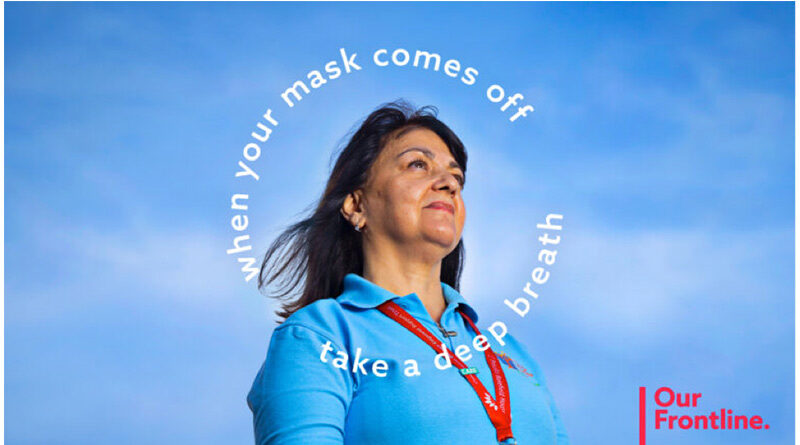Our Frontline’s Take A Breath Campaign Encourages Social Care Workers To Take Care Of Their Mental Health
The pressure and demands of the pandemic placed on frontline workers poses a significant concern around the acute and long-term impact on their mental health. In response to this, last April, Samaritans, Mind, Shout 85258 and Hospice UK joined forces to launch Our Frontline to raise awareness of the mental health impact on frontline workers and highlight sources of support on one easy to access platform.
Our Frontline is a collaborative partnership and campaign between four charities to support the mental health of those working on the frontline against coronavirus. These charities are Samaritans, Hospice UK, Mind and Shout 85258 and through the platform of Our Frontline, we collectively provide round the clock, one-to-one support, mental health support, resources and advice for key workers all in one place. The aim of working together under the one brand is to create one clear voice to communicate with millions of key workers who have been putting their mental health under pressure and give them a single access point to find the support they need. We are pooling our existing services and resources, and those of our partner organisations, to provide a variety of relevant resources and support services to the full range of key workers. By combining our services we are able to offer practical, non-judgmental support with problems ranging from feeling overwhelmed or stressed through to coping with the bereavement of a colleague or family member.
Our Frontline recently launched a new campaign which has been supported by Fearne Cotton, who voiced the radio ad airing at the moment, that aims to support health and social care workers in particular, encouraging them to take a breath and check on themselves.
The additional pressures the pandemic has placed on the shoulders of health and social care staff for such a prolonged period of time has exposed how important mental health support is for people in these professions. While the easing of lockdown may mean things are getting easier for the general public, the recovery phase can be the time that our social care workers finally have the space to process the intense pressure they’ve been under for over a year. With that in mind, it’s crucial that mental health support continues to be provided to address the long term impact of the pandemic, rather than dropping it from the agenda once the pandemic eases.
Our Frontline’s ‘Take a Breath’ campaign places real frontline workers at the heart of the campaign, and reminds social care workers that free, 24/7 emotional support is available, and encourages anyone who might be struggling to reach out.
The support offered through Our Frontline includes:
- Samaritans’ core 24/7 helpline
- Samaritans’ dedicated support line for health and social care workers available 7am – 11pm, 7 days a week
- Hospice UK’s ‘Just B’ bereavement and trauma support line available 8am – 8pm, 7 days a week
- Shout 85258’s 24/7 text service
- Resources, advice and guides from the four charities on themes like dealing with grief or wellbeing toolkits for educators
- Signposting to industry specific support services, for example for police, firefighters and teachers
A spokesperson for Samaritans said: “Those in the role of carer can often be the last to ask for help themselves. Within some professions, there is a stigma associated with mental health and we want to help break down any barriers preventing frontline workers from reaching out for support and seeking help We’re concerned about the prolonged nature of this pandemic and lack of respite frontline workers have had. With the high levels of stress they are under, it’s vital that social care workers prioritise their wellbeing and reach out to get support through Our Frontline if they are struggling at the moment. Often it is after a period of recovery that mental health concerns can come to light, such as burnout and PTSD symptoms, so support needs to address the long-term impact and future repercussions of the pandemic on these key workers’ mental health. Our key workers need to be supported well into the future to recover and rebuild their resilience, long after the acute effects of the pandemic have diminished.”





